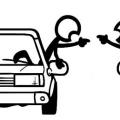STRESS, stress, cf. 1. Highlighting (a syllable in a word, a word in a sentence) with the power of the voice or an increase in tone. The stress falls on something (such and such a sound, syllable, etc.). Syllable, sound under stress, without stress. expiratory stress. Musical … Explanatory Dictionary of Ushakov
Modern Encyclopedia
- (accent) ..1) highlighting a unit of speech (syllable, word, phrase) using phonetic means. It is carried out in various ways: by the force of exhalation (power, or expiratory, stress in Russian, English, French, Polish, Hungarian, ... ... Big Encyclopedic Dictionary
stress- (accent), 1) highlighting a unit of speech (syllable, word, phrase) using phonetic means. It is carried out in various ways: by the force of exhalation (power, or expiratory, stress in Russian, English, French and other languages); ... ... Illustrated Encyclopedic Dictionary
Accent, emphasis; baldness, collision, salting, hooting, ikt, pounding, tonema, poking, hooting, poking, poking, spanking, highlighting, grunting, grunting, grunting, badge, kicking, flapping, dumbfounding Dictionary of Russian synonyms. accent... ... Synonym dictionary
stress- Emphasis, emphasis (Accent, Emphasis) A superscript sign indicating the features of the pronunciation of the word, in particular the stressed syllable. In Russian, an acute accent is used as a stress sign [one of the upper accents - “acute” stress] ... Font terminology
- (lat. Ictus = blow, U.). This grammatical term refers to different shades of strength and musical pitch observed in speech. Depending on whether we consider these shades within a single syllable, or within a whole word, or, finally, ... ... Encyclopedia of Brockhaus and Efron
See the language of VV Vinogradov. History of words, 2010 ... History of words
stress- ACCENT. An increase in voice or tone on one syllable compared to other syllables of the same word or a whole phrase. See expiratory at ... Dictionary of literary terms
ACCENT- ACCENT. 1. Isolation of a unit of speech (syllable, word, phrase) using phonetic means: in Russian, English, French, Polish and a number of other languages - by the force of exhalation; in Lithuanian, Chinese, Japanese and other languages - by changing the height ... A new dictionary of methodological terms and concepts (theory and practice of teaching languages)
Books
- Stress in borrowed words in modern Russian, Superanskaya A.V. This book contains a study on stress in borrowed words, which make up a significant proportion of modern Russian vocabulary. Showing the changes that have taken place since…
Ignorance of the rules of the Russian language does not exempt from responsibility for the impression made. If a person respects himself and his interlocutor, then this is immediately evident not only from the words he utters, but also from the way he emphasizes them. Remember: primitive language is for those who think primitively.
According to WHAT and HOW a person says, one can draw up his portrait. As soon as your interlocutor opens his mouth, his level of culture and erudition becomes obvious. It is curious that more educated people understand each other perfectly and do not ask themselves questions about where to put the emphasis in the words “agreement”, “marketing”, “blinds”, “petition” and others. This is a closed club for the “chosen ones”, or rather, for those who are not indifferent to whether he will be considered cattle or not.
Why do you need to correctly stress the words?
In Russian, stress is free, i.e. is not assigned to any particular syllable, which unties the hands and tongues of all those who do not know the norms and enables ignoramuses to distort pronunciation beyond recognition. Mobile stress in different grammatical forms (cases, degrees of comparison, etc.) sets traps for the illiterate. In order not to look dumber than you really are, just know how to properly stress the most common words.
A person who puts stress in words incorrectly becomes an object of ridicule
Have you noticed that people who make mistakes in pronunciation are the eternal objects of ridicule of satirists, kvnshchikov and simply more literate "users" of the Russian language? This will never change! It is naive to believe that if most of the yard guys say "Will you call?" it has already become the norm. Nothing like this! This still testifies to their backwardness and general low level of education. Is it worth it to be equal to the tail of a steam locomotive? Maybe it’s better to find out where to put the stress in words and speak normally without causing laughter?
For difficult cases, there are dictionaries and reference books that describe in detail the rules of pronunciation. Spelling dictionaries and various information portals, as well as reference books, are designed to eradicate speech errors and teach not only native speakers, but also foreigners the correct pronunciation. Why is this needed? The simplest answer: to successfully pass the exam. However, is this the true goal? For someone and it will be an incredible achievement. Others clearly understand that in order for the language not to become an enemy, it must be studied thoughtfully and constantly work on oneself.
 Where to put the stress in a particular word can be found in the linguistic dictionary
Where to put the stress in a particular word can be found in the linguistic dictionary
To help foreigners and native speakers, numerous Internet resources are being created today, where you can find all possible “difficult” words and expressions. For example, there is a popular Internet portal gramota.ru, where you can not only check spelling and stress, but also hear how familiar words sound ideally (audio dictionaries “We speak correctly” and “Russian oral”). However, it is better to rely on your own brain and write down information once there than to rely on the constant "tips" of the computer.
How to stress words: norms for some special cases
There are many mnemonic exercises for memorization, so choose the ones that are most effective for you. The recommendation for everyone is as follows: since speech is not just a set of words, but meaningful statements in a specific situation, the associative method always helps out when you are in doubt where to put the stress.
 Correct your speech, because speaking correctly is no more difficult than speaking with mistakes
Correct your speech, because speaking correctly is no more difficult than speaking with mistakes
We offer to remember these blocks of information. They can serve as a “lifesaver” for the words blinds, contract, cottage cheese, catalog, quarter, cakes, beets, sorrel, call, pamper, more beautiful, lighten, plum, scoop.
- Don't bite your nails and close the blinds.
- A thief crept into our office and stole the contract.
- Baba baked a pie, but forgot about cottage cheese. It must have been expensive at the bazaar cottage cheese. (both forms within the norm)
- He left us a pledge of one hundred rubles and a catalogue.
- The quarter is coming to an end, who has become richer now?
- Putting on shorts, he remembered the cakes.
- The rain passed, the beets got wet in the garden. And the falcon noticed how many wet beets. The detour is long, beetroot borscht is delicious.
- Do you like sweet caramel, but sorrel is more useful. They talked about the earth, about the boiler and sorrel.
- Who is standing on the square, calling on a mobile?
- In order not to shed tears, it’s better not to indulge.
- A blue dress will help to be much more beautiful.
- In order not to drag a lot, you need to lighten the load.
- The sour plum compote was quickly poured into the garden.
- Scoop cherries with a skull.
If you have your own associative chains that help you correctly place the stress in words, then feel free to use this method, which saves you from stupid cramming. Even if these are “tellings” that are not entirely decent in content (for example, “This is not easy petting for you, but financial marketing”), the main thing is that the desired result is a 100% guarantee of memorization and normative pronunciation.
You can come up with your own "lifesaver" for words such as “plug”, “petition” and “utterly”? Write your options in the comments, we will be glad to have a lively creative thought!
To task number 4 "Orthoepic norms"
Stress rules for nouns.
1. Words of foreign origin, as a rule, in Russian they retain the place of stress, which they had in the source language. In English, stress is most often on the first syllable, while in French it is on the last.
Therefore, English borrowings sound like this:
GENESIS, MARKETING, MANAGEMENT, PORTER;
and French like this:
engraver, dispensary, blinds, rubber, parterre, music stand, chassis.
2. In words denoting measures of length and ending in -meter, the stress falls on the last syllable:
kilometer, centimeter, millimeter, decimeter.
3. In compound words with the second part -the wire with the general meaning "a device for transporting some substance or energy", the stress falls on the root -water-
:
gasoline pipeline, water pipeline, garbage pipeline, light pipeline.
BUT: electric wire, electric drive.
4. In words ending in -log, the stress falls, as a rule, on the last syllable: dialogue, catalogue, monologue, obituary.
5. In verbal nouns the place of stress is preserved, which is in the original verb from which they are formed:
(faith) to confess - faith
provide - provision.
6. In some nouns, the stress is fixed and remains on the root in all cases:
airport - airports
bow - bows - with bows
accountant - accountants
X - with X - X - X
crane - cranes
lecturer – lecturers – lecturers
cake - with cake - cakes - cakes
scarf - scarf - scarf - scarf.
7. In a noun minion the stress falls on the root. In all words formed from this word, the accent on -BAL- falls:
spoiled, spoiled, spoiled, spoiled, spoiled, spoiled.
Stress rules for adjectives.
1. In some adjectives, the stress is the same as in the original nouns from which they are formed:
plum - plum
KITCHEN - KITCHEN
sorrel - sorrel.
2. The stressed syllable of the full form of some adjectives remains accented and in short form:
beautiful - beautiful - beautiful - beautiful - beautiful
unthinkable - unthinkable - unthinkable - unthinkable - unthinkable.
3. In some frequent adjectives with mobile stress, it falls on the root in full form - in the singular and plural; and also in the short - in the masculine and neuter. In the feminine short form, the stress goes to the ending:
right - right - right - right - right
slender - slender - slender - slender - slender.
4. If the stress in the short form of the feminine gender falls on the ending, then in the comparative form it will be on the suffix -E- or- HER-:
sick - sicker, strong - stronger, slim - slimmer.
If the stress in the feminine gender is on the basis, then in a comparative degree it is preserved there:
beautiful - more beautiful, sad - sadder.
Stress rules for verbs.
1. Emphasis on past tense verbs usually falls on the same syllable as the infinitive:
walk - walked, walked
hide - hid, hid.
2. In another group of verbs, the stress in all forms is motionless, and in the feminine of the past tense it passes to the ending:
take - took, took, took, took
lie - lied, lied, lied, lied.
took A, took, poured in, burst in, perceived, recreated, drove, chased, got, got, got, waited, waited, took, locked, locked, called, was called, lilA, poured, lied, tore, called, poured, narwhal, began, drenched, hugged, overtook, skinned, departed, gave away, withdrew, responded, poured, called, watered, understood, arrived, tore, took off, created, plucked, removed.
3. For verbs put, steal, sneak, send, send, send
accent in the form past tense feminine DOES NOT fall on the ending, but stays on the base:
put, stole, stole, sent, sent, sent.
The exception is verbs with shock prefix YOU-, which always drags the accent:
lila - poured out, stole - stole.
4. In verbs ending in -IT, when conjugated, the stress falls on the endings: -ISH, -IT, -IM, -ITE, -AT/-YAT:
turn on - turn on, turn on, turn on, turn on, turn on
hand over - hand over, hand over, hand over, hand over, hand over
get through - get through, get through, get through, get through, get through
bleed - bleed, bleed, bleed, bleed, bleed.
Verbs are conjugated in the same way:
call, exclude, endow, lean, litter, call, lighten, encourage, cheer up, borrow, surround, repeat, call back, call, drill, strengthen, pinch.
5. In the following verbs ending in -IT, the stress does NOT fall on the ending:
vulgarize - vulgarize
become aware - become aware.
6. In verbs, formed from adjectives, the emphasis usually falls on -IT:
fast - speed up, sharp - sharpen, light - lighten, vigorous - encourage, deep - deepen.
BUT: verb embitter, formed from the adjective evil, does not obey this rule.
7. In reflexive verbs the stress in the past tense often changes to an ending or suffix (in masculine past tense verbs):
start - started, started, started, started
to be accepted - to be accepted, to be accepted, to be accepted, to be accepted.
Rules for placing stress in participles.
1.In active past participles with suffix -VSh- the stress, as a rule, falls on the same vowel that is in the word before this suffix:
ignite vsh yy, nali vsh oh, look vsh uy.
2. In passive past participles formed from verbs bend, bend, bend
the accent falls on the prefix:
bent, bent, bent.
3. In the brief passive past participles of the feminine gender the accent falls on the ending:
busy, locked, populated, acquired, filled, encouraged, removed, created.
4. If the stress in full form falls on the suffix -YONN-
, then in the short form it is preserved only in the masculine gender, and in other forms it passes to the ending:
enabled - enabled, enabled, enabled, enabled
delivered - delivered, delivered, delivered, delivered
populated - populated, populated, populated, populated.
The participles change in the same way:
endowed, brought down, encouraged, disabled, repeated, shared, tamed.
5. In full forms of participles with a suffix -T-
formed from verbs with suffixes -ABOUT- And -WELL- in the infinitive, the stress falls one syllable forward:
weeding - polo T th, stab - stab T th, bend - bend T th, wrap - wrap T th.
Rules for placing stress in adverbs.
1. Participles often have an accent on the same syllable as in the infinitive of the verb from which they are formed:
to ask - having asked, to fill in - a bay, to take - to take, to start - to start, to raise - to raise, to undertake - to undertake, to create - to create.
2. In gerunds with a suffix -VSh-, -VSHI- the stress falls on the vowel that precedes these suffixes in the word:
beginning in, otdA in, lift in, profit in, beginning lice s.
Rules for placing stress in adverbs.
1. On the console BEFORE- the stress falls in the following adverbs:
top, bottom, dry.
BUT: white, utterly.
2. On the console BEHIND- the emphasis falls on the words:
ahead of time, dark, dawn.
BUT: envy - enviable.
curator of belles-lettres
Himself Grammar Nazi
In order to be sure that you are right and bring the light of knowledge and culture to the masses, you will have to start with yourself - to clean up the "flaws" of your own speech. Our editorial staff decided first of all to take on the stresses, and we got a kind of rating of 30 words with which “shock” difficulties most often arise. Here it is in alphabetical order and with a hint for the correct accent:
indulge, indulge, indulge
bartender
barrel
water pipeline, gas pipeline, garbage pipeline, oil pipeline, but: electrical wire
contract (and contracts)
blinds
enviably
catalog
quarter
more beautiful
culinary and culinary ( both options are equal)
marketing
masterful
extended
newborn
security
ease
uncork
loop (loop - Appropriate in everyday speech)
call, call, call
pullover
beet
dancer, dancer
cottage cheese and cottage cheese ( both options are equal)
tiramisu
cakes
immediately
shoe
phenomenon
scoop

What is written in pen...
The insidiousness of all the rules and lists is that they do not linger in the head: read - forgot. There are several ways to retain useful information in memory, in our case, words with the correct stress.
#sing now. A difficult word for you needs to be said out loud loudly, clearly, several times (you can also sing) and ... in front of witnesses. Let friends or colleagues support you and join your shock flash mob with their problematic words (“Venice is more beautiful than Paris, more beautiful, more beautiful, more beautiful than Paris”, “they call me, they call me”, “my boyfriend is a barmen, barmen, barmen”). This is our psychology: what we do not alone is better remembered.
#wonderful moment. For those who have a developed imagination, it is easiest to involve associations and images associated with it in memorizing any information. Here, for example, is a healthy beetroot vegetable, and its ruddy grandmother Fyokla sells it. And a great marketing specialist knows everything about how to keep the brand!
#graphomania. Remember how at school, while studying a foreign language, we made up dialogues and stories with new words, picked up rhymes for them or came up with funny poems? The principle also works for the native great and mighty, you just need to give free rein to your imagination! There are a lot of ready-made cheat sheets on the Internet, take note: “We ate cakes for a long time - the shorts didn’t fit”, “You don’t carry curtains for us, we will hang the blinds”, “Phenomen calls on Wednesdays, having accepted the contract for years”, “The ringer is calling, they are calling in a bell, so that you can remember correctly!
And, of course, dictionaries and reference books will always help out: a spelling, spelling dictionary (translated from ancient Greek, “orthoepy” means correct pronunciation), a dictionary of stresses. Online resources will not let you down either: Gramota.ru portals (be sure to check out the Memoirs section) and gramma.ru, Yandex.Dictionaries, orfogrammka.ru website, which, unlike printed publications, are always at hand thanks to the ubiquitous Internet. Let's talk nice!




